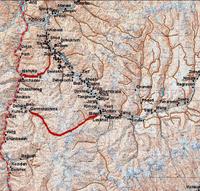Yesterday,
electricnomad had a quite strong
discussion with "Fabrice Naps" on the
thorntree of LP. I know both of them by email contact. It was not the first time that electricnomad, who seems to live in Feizabad, expressed his strong opinion, and it was not the first time that naps reacts strongly to post on travel's forum.
The main point of electricnomad was the responsability of the tourists when they travel in regions like Afghanistan.
I thought a little bit today about that statement and the explanation which followed. He explained that everytime there is a kidnapping, the security measure on the NGO and GO's staff get stronger and makes their work more difficult, espacially the contact with the population. Furthermore, the investments in the region as well as the recruiting of new NGO workers become harder, since the kidnapping is a sign of instability.
His point of view is very interesting in many ways. First, It shows how the NGO workers will react when they'll meet independant travelers like me in the country: (quite) negatively. Second, how responsable is a tourist when he is travelling in countries in reconstruction like Afghanistan? I haven't been there yet, therefore my ideas are very "theoretical". But:
First, I can easily agree with electricnomad. Everytime a foreigner is kidnapped, the image of the situation in the world, as well as the security measure for workers on the fields get worse. That's a fact. Moreover, everytime there is a foreigner without a structure taking care of his security, the risk of being kidnapped is bigger. (here, I do not speak about "well integrated" foreigners, speaking dari and linked in some way with the population. ) However, the security analysis should be differentiate. The situation in the North of the country is surely not the same as in the South. Even if the risk is not zero in Badakhshan, it is not equally distributed with the other part of the country.
But there are factors which have much more influence on the situation for the NGO workers on the field: The first one is the promise made by our governments which have not been fulfilled. They promised a lot of money and help. Some reports seem to indicate that only a percentage of it arrived on the field. That could make the work of the NGOs more difficult!
The second is the presence of a number of so called NGO's in Afghanistan which do not work for the developpment of the country. That's what caryatid on the
thorntree of LP called SCUD ( standard construction unit for development). Even if they haven't yet harmed the image of the NGO outside the country, it seems that it is the case inside the country. (Once again, as I haven't been there yet, and therefore, all that is theoretical...). Such SCUD could also become a Public Relation disaster.
Finally, what should be the goal of the aid workers there? Should it be the poppy eradication, the egality of chance for men and women or the construction of roads, of schools, of durable cultivation and development of the economy? All that is important. But what are the priorities for the country?
I think that the factors I mentioned here are at least as important for the lack of development of Afghanistan, as the presence of independant travelers.
Electricnomad concluded by the remark:
I think that Afghanistan faces much bigger challenges and dangers at the moment than stupid tourists. But this sentence was probably just a provocation.







